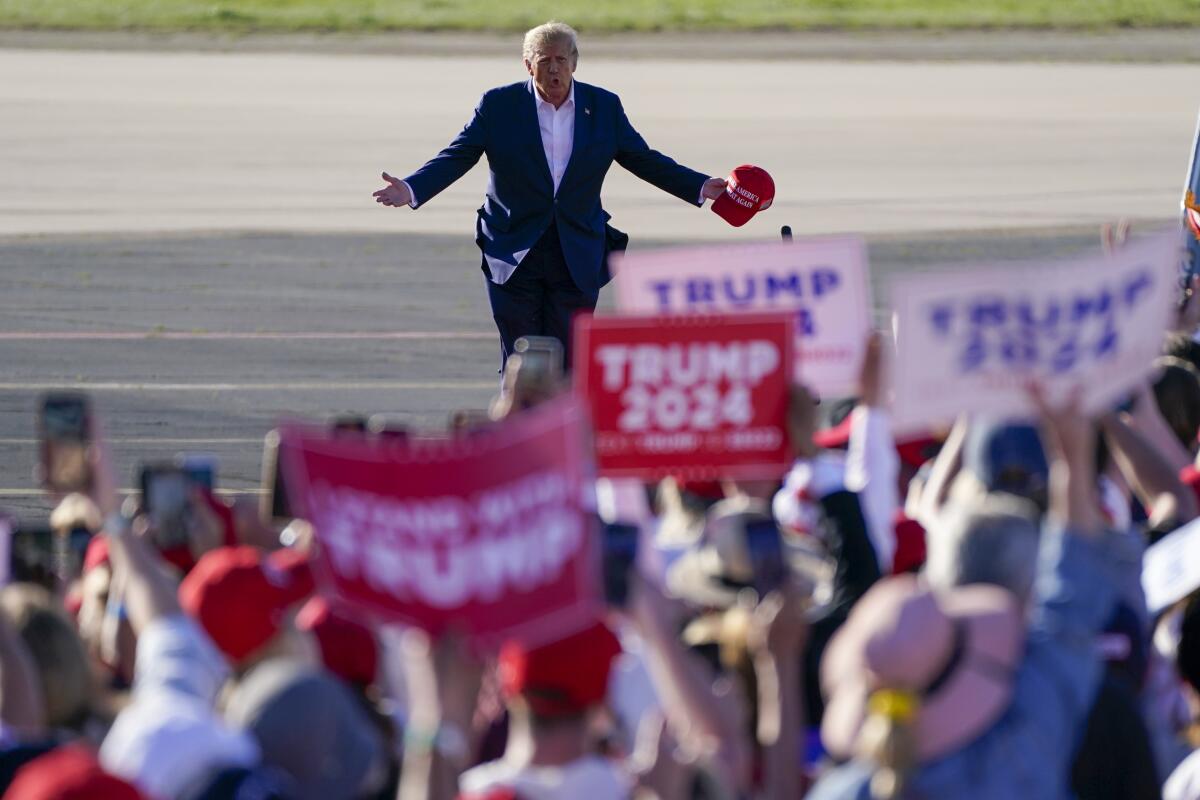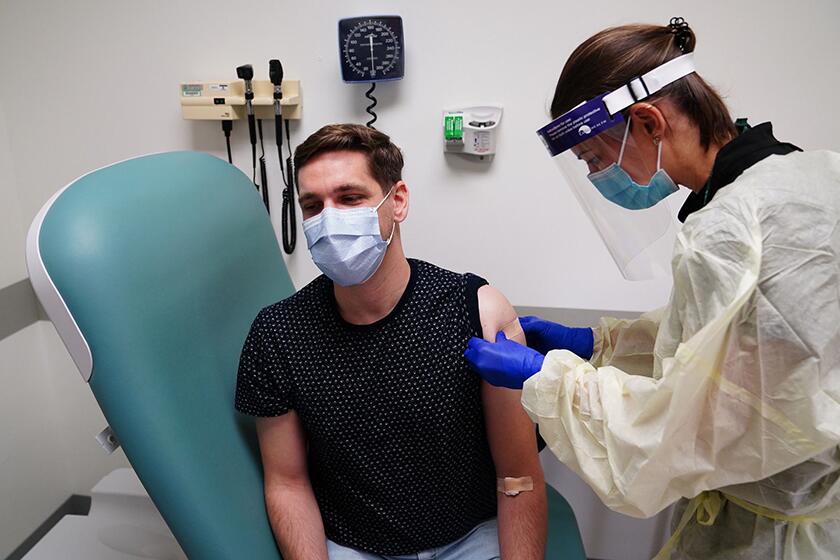Newsletter: Trump has been indicted. That wasn’t so bad, was it?

- Share via
Good morning. I’m Paul Thornton, and it is Saturday, April 1, 2023. Surreal as it may seem, nothing you are about to read is an April Fools’ joke. Let’s look back at the week in Opinion.
When thinking about the indictment of former President Trump in New York and the reaction to it, I recall what the exiled Ayatollah Ruhollah Khomeini (bear with me here) said about how he felt returning to Iran in 1979 amid that country’s revolution: “Nothing. I feel nothing.”
Khomeini, of course, was an enigmatic figure who presided over human rights abuses and the repression of women as Iran’s supreme leader, but I find some insight in his dismissive comment in such an important moment: For years, everything has been building up to this point, when something we couldn’t imagine happening just ... happened. You’d expect jubilation or outcry over catharsis like this, and instead what we get is in many ways the most reserved, understandable human emotion at a historic, unprecedented occasion — nothing.
So when I saw the push notification on my phone Thursday afternoon that the Manhattan grand jury had voted to indict Trump, finally answering a question those of us worried sick about the state of democracy in the U.S. have asked — Is an American president above the law? — immediately I felt what that odious ayatollah expressed upon what should have been his jubilant return to Iran: nothing.
Maybe it’s just a coping mechanism for dealing with six-plus years of upheaval.
Others, thankfully, aren’t at such a loss for words. Writing for The Times’ op-ed page, former U.S. Atty. Harry Litman predicts more indictments are coming to Trump World, with the former president under multiple inquiries and the efforts by his top lieutenants to stonewall investigators crumbling in court. This, Litman says, is the “first phase of an extended test of the system’s ability to deliver justice under uniquely difficult conditions.”
The Times’ editorial board makes an obvious point that still deserves repeating as long as the former president is seeking his old job back: No matter what investigators or juries find, voters can have the final say, and they have more than enough information to indicate that Trump should never occupy the White House again:
“Regardless of the outcome of this or any other prosecution, Trump has disqualified himself from any consideration as a candidate for the office he disgraced. That’s true regardless of the outcome of this criminal case.
“To those who suggest that the indictment of a former president somehow threatens the office of the presidency, we would argue that nothing would so threaten the presidency, and the nation, as the election of Trump in 2024. He is a twice-impeached narcissist whose self-serving falsehoods about a stolen election inspired a terrorist attack on the U.S. Capitol.
“Convicted or acquitted, Trump must not be returned to the White House. The Republican Party and, if necessary, voters can prevent that calamity, whatever judges and juries might decide.”
I had planned on opening this newsletter with a screed on mass shootings, but in a country where they are a regular occurrence and the indictment of a former president is not, “fresher” news took the top spot. But in case anyone’s forgotten: Six people, including three children, were killed at a school in Nashville on Monday, restarting the familiar post-shooting cycle of mourning, anger and callous acceptance that leaves the deadly status quo unchanged. Op-ed columnist Jackie Calmes says we shouldn’t be deceived into thinking that this regular cycle of violence means Congress is either powerless to stop it or has done all it can on guns. L.A. Times
Even as mass shootings multiply, federal judges are erasing gun safety laws. The calls for more gun control grow louder, but the revolution on firearm safety underway in government isn’t what you might think, and it’s taking place in the courts. UCLA law professor Adam Winkler details the gun safety laws and regulations that have recently been thrown out by federal judges: “Even a partial list of the laws struck down or enjoined is startling: bans on possession of firearms by domestic abusers; bans on guns in churches, hospitals and bars; prohibitions on firearms in the hands of people charged with felonies; restrictions on 18-to-20-year-olds carrying weapons; prohibitions on loaded guns in vehicles; and bans on guns with obliterated serial numbers.” L.A. Times
There’s nothing to celebrate about Mark Ridley-Thomas’ corruption conviction. The former L.A. City Councilmember, L.A. County supervisor, state legislator and civil rights activist was indicted in 2021 on federal corruption charges and convicted by a jury this week. Ridley-Thomas helped rebuild South L.A. after the 1992 riots, oversaw the reopening of the Martin Luther King Medical Center in Willowbrook and was at the forefront of finding humane solutions to homelessness in Los Angeles. Sadly, his conviction puts him in the same company as other disgraced ex-City-Council-members-turned-felons, and it raises questions over whether the public servants we elect are working for residents or themselves, says the editorial board. L.A. Times
Enjoying this newsletter? Consider subscribing to the Los Angeles Times
Your support helps us deliver the news that matters most. Become a subscriber.
Tulare Lake is back. But did it ever really go away? I am stunned every time I see it driving on the 5 Freeway in the San Joaquin Valley between Lost Hills and Kettleman City — the brown, desert-like rolling hills right up against a vast, flat plain of irrigated cotton fields and other farms that made up the bed of Tulare Lake, once the most expansive freshwater lake in the western United States. The lake dried up by the early 20th century from draining and water diversions primarily by agricultural interests, but that doesn’t mean it permanently disappeared — as we are learning this winter with the lake’s reemergence from snow melt and torrential rains. The lake has periodically returned in wet years after its supposed “disappearance,” writes Trace Fleeman Garcia, something Indigenous residents of the area long ago warned would happen. This isn’t surprising: Nature formed Tulare Lake for a reason, and no matter how hard humans try, when there’s enough water looking for the lowest possible land, a body of water will form. L.A. Times
It was a cold, wet opening day at Dodger Stadium — wait, Dodger Stadium? The place that has put together multiple rainout-free streaks of more than 1,000 games? Editorial writer Carla Hall says the frigid opener is emblematic of the elusiveness of winter’s end in Los Angeles this year: “Opening day for the Dodgers should feel like opening day for spring. Nearby Elysian Park, the traditional site of daylong partying to celebrate the Dodgers’ home opener, should be filled with the sounds of banda music and the sizzle of barbecue, not accompanied by the slosh of cars passing on wet roads. Even post-rain means soggy leaves dripping rainwater on you in the park.” L.A. Times
Stay in touch.
If you’ve made it this far, you’re the kind of reader who’d benefit from subscribing to our other newsletters and to The Times.
As always, you can share your feedback by emailing me at paul.thornton@latimes.com.
A cure for the common opinion
Get thought-provoking perspectives with our weekly newsletter.
You may occasionally receive promotional content from the Los Angeles Times.







